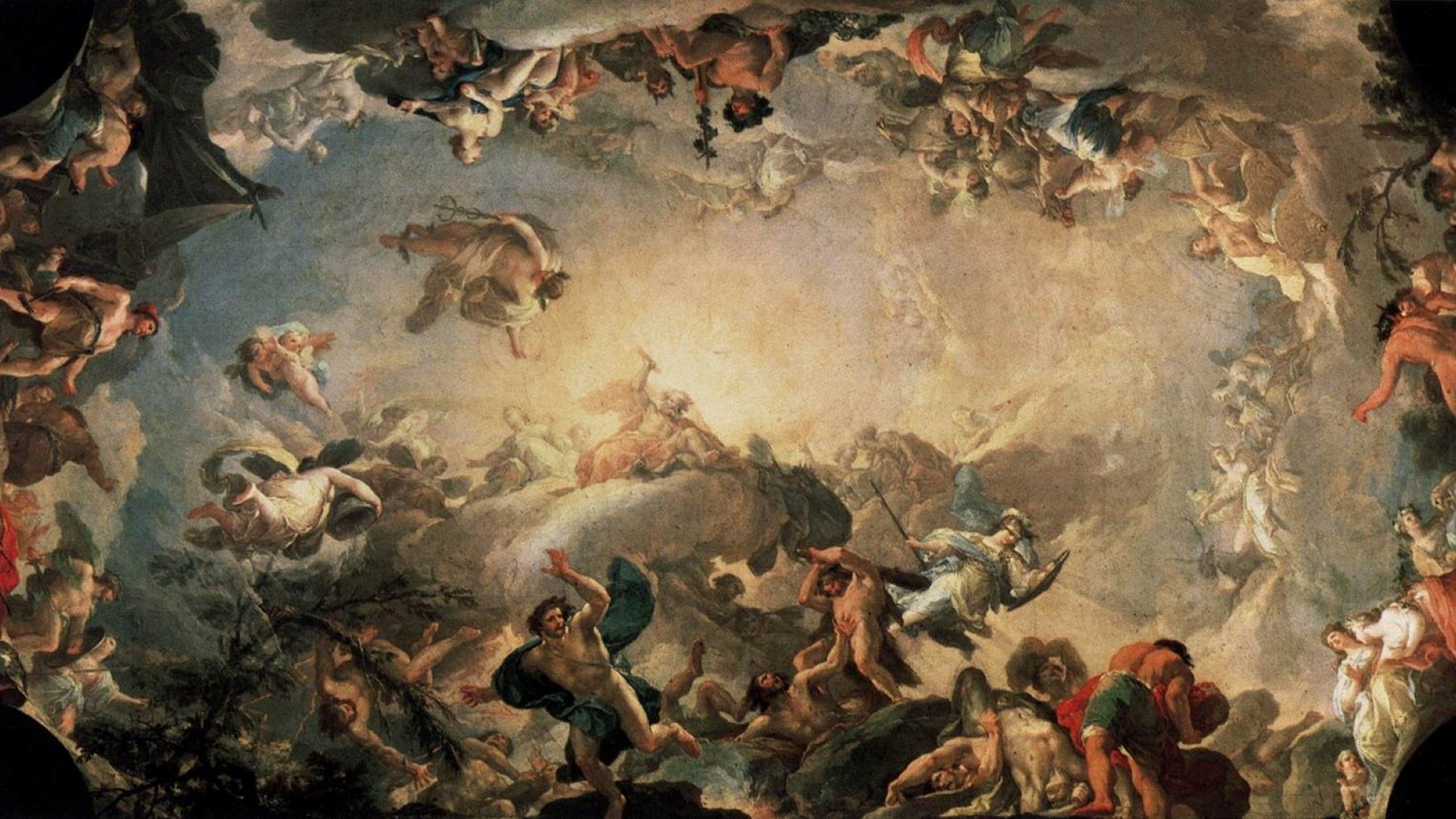
Ceryneian Hind

The Third labor of Heracles
In Greek mythology, the Ceryneian Hind (Greek: Κερυνῖτις ἔλαφος Kerynitis elaphos), also called Cerynitis or the Golden Hind, was an enormous hind (female deer) that lived in Keryneia, Greece. It had golden antlers like a stag and hooves of bronze or brass, and it was said that it could outrun an arrow in flight. It was sacred to Artemis (the chaste goddess of the hunt, animals, and unmarried women). The capture of the hind was the third labour of Heracles.
A doe bearing antlers was unknown in Greece, but the story of the hind is suggestive of reindeer, which, unlike other deer, can be harnessed and whose females bear antlers. The myth relates to the northern Hyperborea, which may have been the archaic origin of the myth itself, as Robert Graves thought.
When the sun is in the sign of Scorpio, the constellation Hercules rises. The Greeks referred to the constellation of Hercules as the Stag ("hind" is another word for doe), the identification of the constellation with Hercules was made by the Romans.
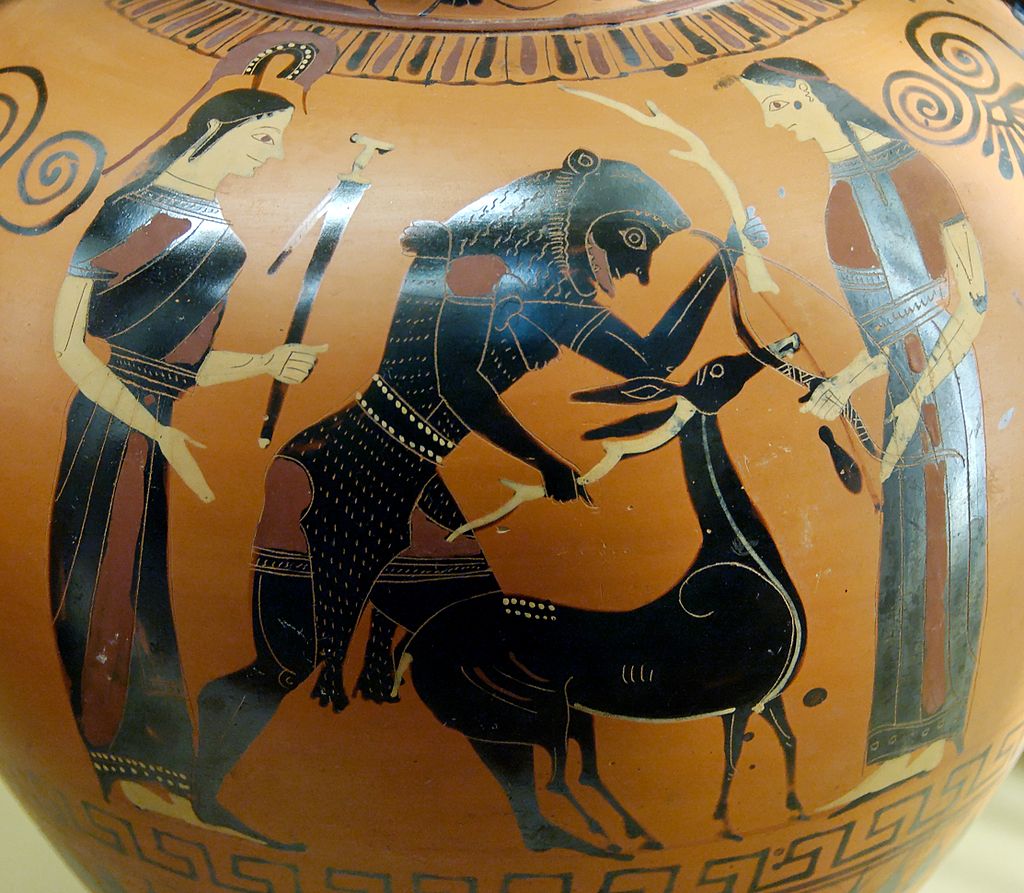
Third labor of Heracles
Eurystheus and Hera were greatly angered to find that Heracles had managed to escape from the claws of the Nemean Lion and the fangs of the Lernaean Hydra, so decided to spend more time thinking up a third task that would spell doom for the hero. The third task did not involve killing a beast, as it had already been established that Heracles could overcome even the most fearsome opponents, so Eurystheus decided to make him capture the female Ceryneian Hind, as it was so fast it could outrun an arrow.
After beginning the search, Heracles awoke from sleeping and he could see the hind from the glint on its antlers. Heracles then chased the hind on foot for a full year through Greece, Thrace, Istria, and the land of the Hyperboreans. In some versions, he captured the hind while it slept, rendering it lame with a trap net. In other versions, he encountered Artemis in her temple and she told him to leave the hind and tell Eurystheus all that had happened and his third labour would be considered to be completed. Yet another version claims that Heracles trapped the hind with an arrow between the fore legs of the creature.
Eurystheus had given Heracles this task hoping to incite Artemis' anger at Heracles for his desecration of her sacred animal. As he was returning with the hind, Heracles encountered Artemis and her brother Apollo. He begged the goddess for forgiveness, explaining that he had to catch it as part of his penance, but he promised to return it. Artemis forgave him, foiling Eurystheus' plan to have her punish him.
Upon bringing the hind to Eurystheus, he was told that it was to become part of the King's menagerie. Heracles knew that he had to return the hind as he had promised, so he agreed to hand it over on the condition that Eurystheus himself come out and take it from him. The King came out, but the moment Heracles let the hind go, it sprinted back to its mistress, and Heracles left saying that Eurystheus had not been quick enough. Eurystheus, upset that Heracles had managed to overcome yet another creature, told him to bring the fearsome Erymanthian Boar back to him alive.
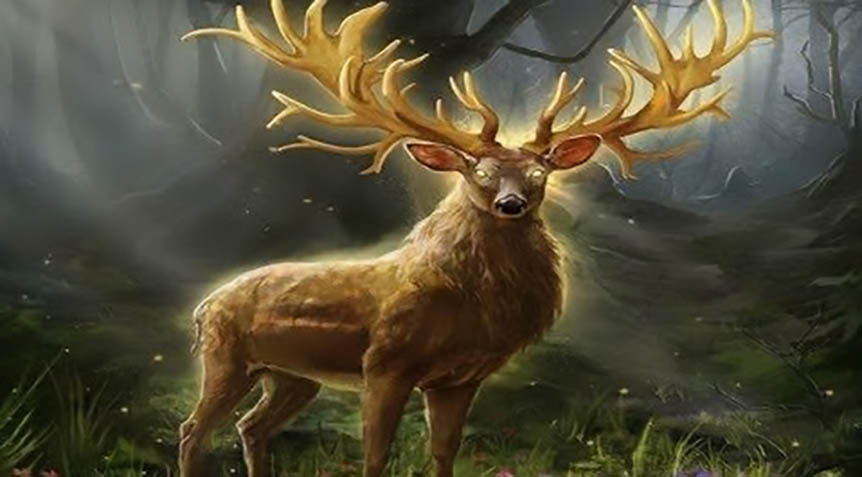
CLASSICAL LITERATURE QUOTES
Pseudo-Apollodorus, Bibliotheca 2. 81 (trans. Aldrich) (Greek mythographer C2nd A.D.) :
"His [Herakles' (Heracles')] third labour was to bring back alive to Mykenai (Mydenae) the Kerynitian Hind (Elaphos Kerynitis). It was at Oinoe, a golden-horned deer sacred to Artemis. In his desire neither to kill nor to wound it, Herakles spent a whole year pursuing it. Finally the animal tired of the chase and took refuge on the mountain known as Artemision (Artemisium), and from there proceeded to cross the Ladon River. As it was crossing, Herakles got it with an arrow, hoisted it on his shoulders pressed on urgently through Arkadia (Arcadia). Artemis along with Apollon accosted him on the way, reached for the Hind, and berated him for trying to kill her sacred animal. But Herakles pleaded necessity and said that Eurystheus was to blame, and thus soothed the goddess' wrath; and he brought the animal still living to Mykenai."
Callimachus, Hymn 3 to Artemis 98 ff (trans. Mair) (Greek poet C3rd B.C.) :
"Thou [Artemis] didst find by the base of the Parrhasian hill deer gambolling--a mighty herd. They always herded by the banks of the black-pebbled Anauros--larger than bulls, and from their horns shone gold. And thou wert suddenly amazed and sadist to thine own heart : ‘This would be a first capture worthy of Artemis.’ Five were there in all; and four thou didst take by speed of foot--without chase of dogs--to draw thy swift car. But one escaped over the river Keladon (Celadon), by devising of Hera, that it might be in the after days a labour for Herakles, and the Keryneian (Cerynian) hill received her . . . A golden car didst thou [Artemis] yoke, and golden bridles, goddess, didst thou put on thy deer. And where first did thy horned team begin to carry thee?"
Diodorus Siculus, Library of History 4. 12. 13 (trans. Oldfather) (Greek historian C1st B.C.) :
"The next Command [the fourth Labour] which Herakles (Heracles) received was the bringing back of the hart which had golden horns [the Kerynitian (Cerynitian) Hind] and excelled in swiftness of foot. In the performance of this Labour his sagacity stood him in not less stead than his strength of body. For some say that he captured it by the use of nets, others that he tracked it down and mastered it while it was asleep, and some that he wore it out by running it down. One thing is certain, that he accomplished this Labour by his sagacity of mind, without the use of force and without running any perils."
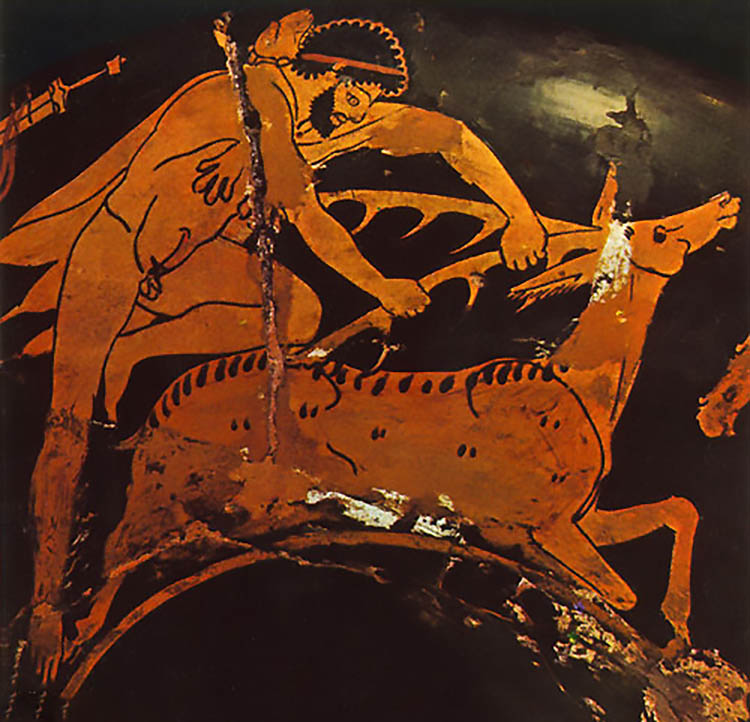
Quintus Smyrnaeus, Fall of Troy 6. 223 ff (trans. Way) (Greek epic C4th A.D.) :
"[Depicted on the shield of Herakles' son Eurypylos :] There fashioned was the fleetfoot stag [Kerynitian (Cerynitian) Hind] which laid the vineyards waste of hapless husbandmen. The Hero's [Herakles'] hands held fast its golden horns, while it snorted breath of ravening fire."
Aelian, On Animals 7. 39 (trans. Scholfield) (Greek natural history C2nd A.D.) :
"Euripides says in his Temenidae that the ‘Labour’ [Kerynitian (Cerynitian) Hind] of Herakles had horns, in the following verses : ‘And he came in quest of the golden-horned deer, braving one fearful task in his mighty labours, over mountain haunts to meadows untrodden, and to groves where flocks graze.’ And the Theban minstrel [Pindar] in one of his Epinician odes sings thus : ‘Necessity laid upon him [Herakles] by Eurystheus through his father urged him to fetch the hind with the golden horns (elaphos khrysokeros).’"
Pseudo-Hyginus, Fabulae 30 (trans. Grant) (Roman mythographer C2nd A.D.) :
"The wild stag with golden horns in Arcadia he [Herakles] brought alive to show Eurystheus." - Hyginus, Fabulae 30
Seneca, Hercules Furens 222 ff (trans. Miller) (Roman tragedy C1st A.D.) :
"[The labours of Herakles :] The nimble hind of Maenalus, raising her head bounteously adorned with gold, was caught by his long pursuit."
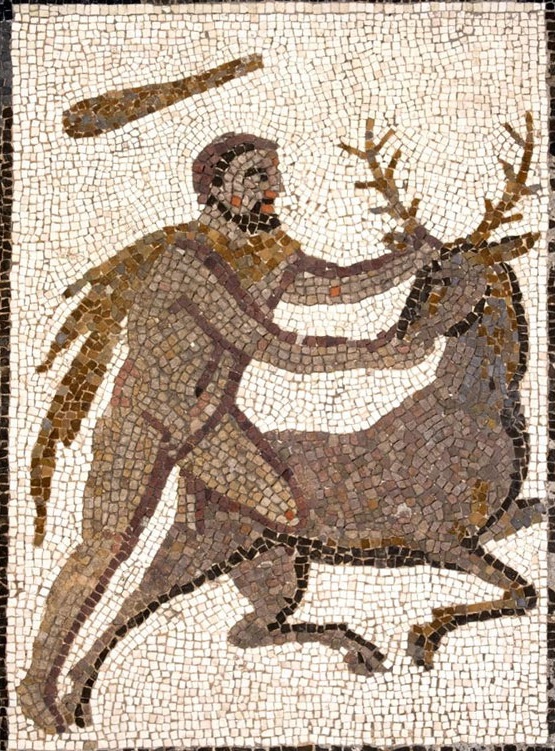
Sources
GREEK
Apollodorus, The Library - Greek Mythography C2nd A.D.
Callimachus, Hymns - Greek Poetry C3rd B.C.
Diodorus Siculus, The Library of History - Greek History C1st B.C.
Aelian, On Animals - Greek Natural History C2nd - 3rd A.D.
Quintus Smyrnaeus, Fall of Troy - Greek Epic C4th A.D.
ROMAN
Hyginus, Fabulae - Latin Mythography C2nd A.D.
Seneca, Hercules Furens - Latin Tragedy C1st A.D.
"Theoi"
"Wikipedia"
Our Mobile Application
Check out Our Mobile Application "Ancient Greece Reloaded"


